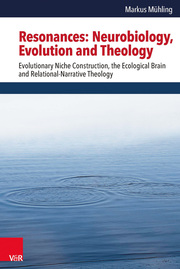Detailansicht
Resonances: Neurobiology, Evolution and Theology
Evolutionary Niche-Construction, the Ecological Brain and Relational-Narrative Theology, Religion, Theologie und Naturwissenschaft/Religion, Theology, and Natural Science (RThN), Religion, Theologie und Naturwissenschaft /Religion, Theology, and Natu
ISBN/EAN: 9783525570364
Umbreit-Nr.: 6730132
Sprache:
Englisch
Umfang: 254 S., with 15 figures
Format in cm: 2.2 x 23.8 x 16.2
Einband:
gebundenes Buch
Erschienen am 17.09.2014
Auflage: 1/2014
- Zusatztext
- Markus Mühling presents an epistemological theory of revelation as perception and a relational-narrative theological ontology based on the concept of dramatic coherence, in which the triune life is understood not as an anomaly within ontology, but rather as the decisive condition of its possibility. Mühling further demonstrates that potential for resolving certain theological problems arises if new insights from the natural sciences, such as the theory of the ecological brain in the neurosciences and the theory of niche-construction in evolutionary theory, are taken into account. Similarly, he also proposes that neuroscience and evolutionary biology can procure advantages from a dialogue with theology.
- Kurztext
- An epistemological theory of revelation.
- Autorenportrait
- Dr. theol. Markus Mühling is a Professor of Systematic Theology at the University of Lüneburg.
- Leseprobe
- Markus Mühling presents an epistemological theory of revelation as perception and a relational-narrative theological ontology based on the concept of dramatic coherence, in which the triune life is understood not as an anomaly within ontology, but rather as the decisive condition of its possibility. Mühling further demonstrates that potential for resolving certain theological problems arises if new insights from the natural sciences, such as the theory of the ecological brain in the neurosciences and the theory of niche-construction in evolutionary theory, are taken into account. Similarly, he also proposes that neuroscience and evolutionary biology can procure advantages from a dialogue with theology.>
